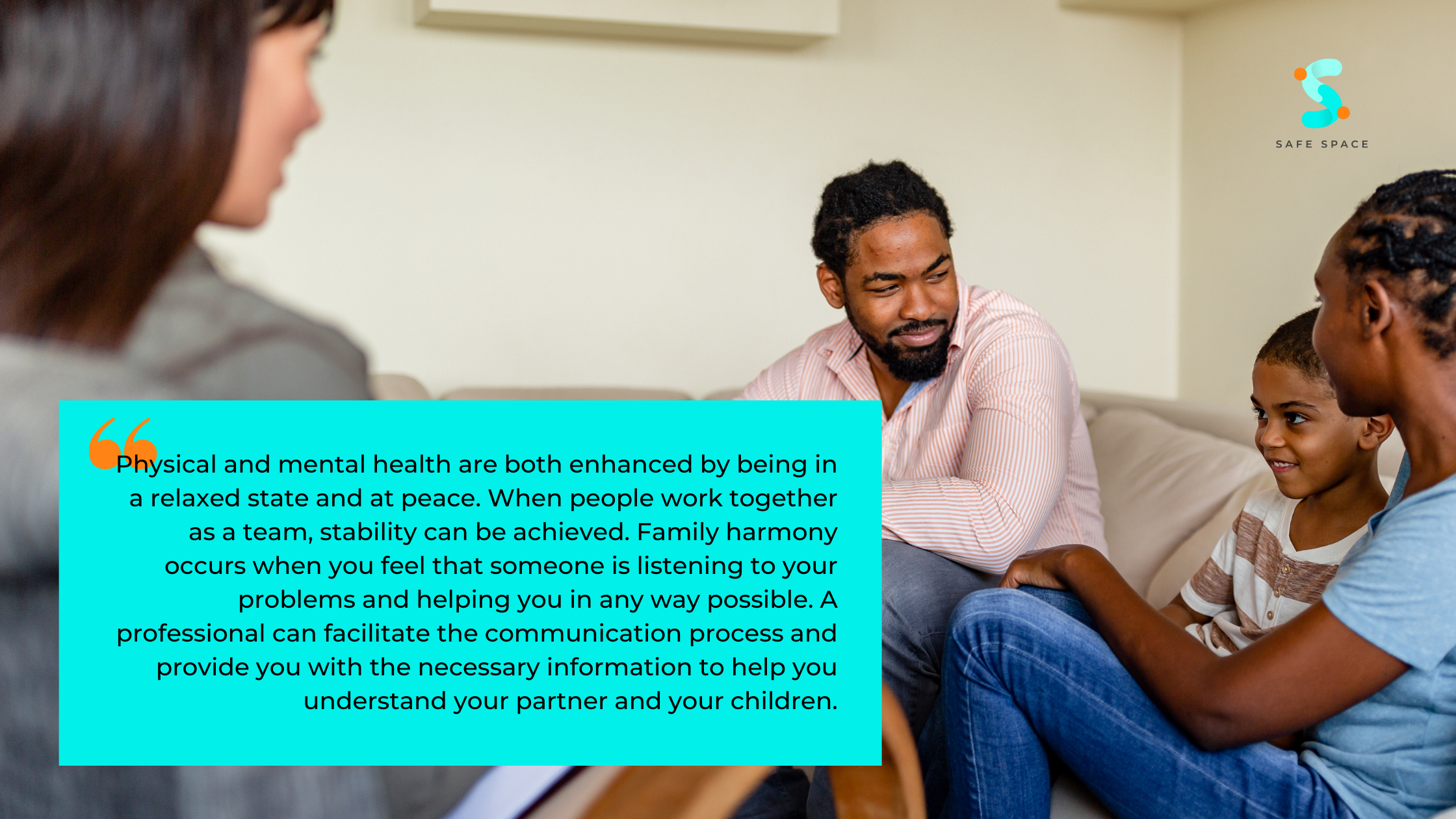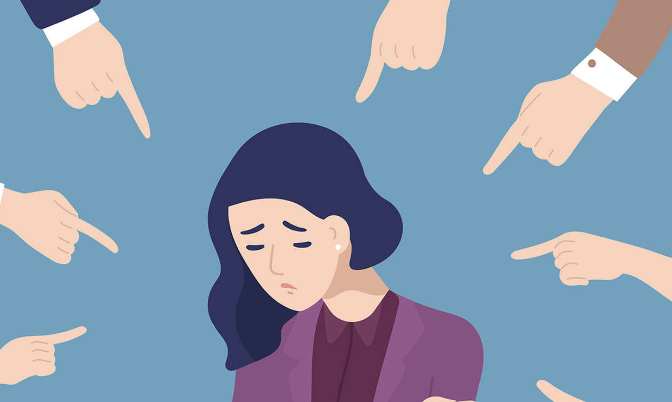Family therapy is evidence-based, and treatment is carried out with you, your therapist, and your family. Family therapy aims to help you and the family open and maintain an honest dialogue about mental health. The mental health issues that most affect the family will be priorities.
Like most kinds of therapies, there will be an emphasis on making sure that all involved appreciate other points of view.
Sessions will have an end goal of identifying ways the family unit can support each other in the years to come, whether through major mental health concerns or just tricky aspects of family life.
How does family counselling work?
Family therapy is a type of psychological counselling that is explicitly designed to help families. The therapy aims to resolve conflicts and improve communication.
It differs from other therapies because it is often seen as being short term. As a result, sometimes not all family members will participate, but sessions can still proceed.
A family involved in family therapy will receive a personalised treatment plan. This plan will consider all the information the family brings to the therapist and the therapist’s insights after the first meeting.
Therapy for your partner, children, or other family members can help you improve troubled relationships. A family therapy session may focus on specific issues such as marital and financial issues, the conflict between parents and children, or the effect of substance abuse or mental illness on the entire family.
In some cases, you may seek family therapy in addition to other types of mental health treatment, particularly if one of you is struggling with a mental illness or addiction that requires additional treatment or rehabilitation.
For example:
- When someone in the family has a severe mental illness such as schizophrenia, they can participate in family therapy – but the patient should also continue to receive individual treatment and medications.
- When someone has an addiction, they can receive both family therapy and residential treatment. Often, family therapy is conducted even when the person with an addiction does not seek treatment on their own.
A family therapist can help a family that is experiencing stress, grief, anger or conflict. Using this method can help you and your family members learn to communicate better and cope in a way that will bring you closer together.
What are the main types of family counselling?
There are many different types of therapy involved in family therapy. These include:
There are five fundamental principles behind structural therapy.:
Structural therapy
- When a structural therapist works with patients, they focus on the interactions between people, not their psyches.
- The family is seen as the ‘matrix of identity, where family members develop themselves concerning other family members. The matrix of identity is constantly changing.
- As individuals accommodate each other, family members develop recurring patterns of interaction over time.
- It is not the absence of stress or conflict that defines a well-functioning family, but how effectively it handles them as it responds to its members’ different needs and the changing conditions in its immediate environment.
- The family therapist holds a unique position in that they help families outgrow negative growth patterns and become a more robust entity after therapy.
Strategic Therapy
In a sense, strategic therapy represents a synthesis of several different psychotherapy approaches. The five stages of strategic therapy are:
- The social stage.
- The problem stage.
- The interactional stage.
- The goal-setting stage.
- The stage of the task.
Systemic Therapy
This kind of therapy is based on family therapy or something known as family systems therapy. Over the past few decades, systemic therapy has moved beyond linear causality. Instead, it is now a treatment that approaches problems as they emerge in a social and cultural context.
Narrative Therapy
This type of therapy is unique because it encourages people to use their skills in addressing the problem and minimising minor daily issues. It is the theory that people create a range of narratives that can help them identify who they are and how best to live their lives in life. A narrative therapist’s goal is to assist the narrator in clarifying, developing, and supporting their journey in life.
Transgenerational Therapy
With transgenerational therapy, therapists can observe interactions within families across multiple generations. A family therapist’s observation and analysis of family interactions facilitate a better understanding of issues within the family unit. As well as current issues, therapists may also pick up on future struggles or stressful situations. When used with other modalities, transgenerational concepts can give a unique perspective on the issues being addressed.
Psychoeducation
In psychoeducation, those with mental health conditions and their families are educated and supported to cope with their situation. Psychoeducation aims to counter the stigma surrounding mental health issues and the individuals who live with them. The four significant aims of psychoeducation are:
- Sharing of information
- support with medication and treatment
- Training and help for self-help
- an option for venting in a safe environment
What does a family counsellor do?
Suppose a family member has a severe mental illness such as schizophrenia, bipolar disorder or substance abuse. In that case, the therapist can help the other family members come to terms with and understand the issue. Notably, the therapist can also give them strategies that will help them adjust to any psychological changes the family member is experiencing.
Generation gap issues that can flare up between child and parent, or child and grandparent, can also be discussed and treated by the counsellor.
Issues arising from divorced and blended family disruption are also addressed by counselling.
Counsellors can also support families with unmarried parents, those who live in relationships, homosexual couples raising a family, and those from different cultures or religious backgrounds.
A family counsellor can assist when a member feels scapegoated or isolated or receives little or no help from the family members.
Any pattern of problems in family relations can be taken care of by a family counsellor.
Broader issues a counsellor can help with:
- Maintaining honesty between all family members
- Building trust between every family member
- Fostering a supportive, empathic family environment
- Managing sources of stress and tension within the family.
- Helping family members move on from painful pasts.
- Encouraging family members to forgive one another.
- Conflict resolution in the family.
When should you seek family therapy?
There are some clear signs that a family needs to investigate the possibility of using a family therapist. These include the following situations:
- The silence when the family is together. For example, suppose the family travels in the car together or sits down at the dinner table, and no one is talking. In that case, there is a clear and urgent problem.
- Sometimes family members present with sudden and dramatic mood swings. This could be a problem that needs managing and a sign of frustration at relationships within the family unit.
- Substance abuse could become an issue within a family. This could be through alcohol, drugs or another substance.
- For example, trauma within the family, with the death of someone in the extended family, could be an issue that warrants therapy. Trauma can be a significant issue, and a family can find it challenging to move on from it.
- A child in the family can be struggling with schoolwork or their behaviour in school (or at home). This can be down to many reasons but can be because expectations and behaviour management at home are inconsistent.
- An undiagnosed mental health issue in the family can cause enormous challenges. The stress and strain such issues can cause to others can disrupt a family, and therapy is needed.
What can you expect from family therapy?

Family therapy generally fits into around one hour a session, and it is often a short term plan. Most plans run for 12 sessions.
Every family is different, however, and it is sometimes down to the family circumstances and the therapist’s views as to how many sessions should take place.
During the sessions, you can expect to:
- Analyse how your family solves problems and expresses emotions
- Learn how family roles, rules, and behaviour patterns contribute to conflict – and how to resolve it
- Find out what your family’s strengths and weaknesses are, such as caring for each other and having difficulty confiding in one another.
- Identify your family’s challenges and how you’re handling them.
- Develop healthy ways to interact and to relate to each other by learning new skills
- Plan ways to achieve the goals you set for yourself and your family
What are the most important principles of family therapy?
Although the family therapy schools rely on multiple theories, the following assumptions are shared by all:
- Family interaction and relationships and the context in which behaviours and experiences develop are linked to problematic behaviour patterns and experiences;
- In the context of interpersonal relationships, a person’s behaviour changes or reinforces a shift that’s occurring;
- Family interaction is the focus of therapeutic work;
- In therapy, patients and their families resources and autonomy are used as therapeutic levers.
What is the best way to conduct a family therapy session?
The therapist will have reviewed notes from each session before family therapy begins. Then, they will set clear rules for the therapy session. The therapist will ensure that all members of the family are involved in the setting of these rules.
Key elements that a therapist will include:
- We are asking each family member what kind of dynamic they prefer. This will help guide the process moving forward.
- They are ensuring that each family member can speak without being interrupted. The therapist is the mediator and will be providing the rules set up by the family are followed.
- Allowing all family members to offer solutions to problems the family faces
- Ensuring the environment in which they work is professional and clean.
- Reliability. A good therapist will ensure appointment times are stuck and that any cancellations are notified in advance.
- Good listening. A therapist will not give you advice; they will simply listen to what you say and offer some new viewpoints. In the session, you should feel that you are being heard.
Is family counselling worth it?
Family counselling has several distinct benefits that add value to the life of a family. These make counselling worth it whenever a family requires objective, professional support, and include:
Enhancing Relationships and Strengthen Bonds
It is usual for siblings to have disagreements occasionally, and often they are not that serious. Still, some should be settled as soon as possible. A broken family relationship can result from not resolving them early. For example, there are times when siblings develop jealousy towards one another, which could result from them being in a competitive position for attention, among other reasons. Unfortunately, many parents fail to understand these children by negating the significance of the issue. As a result, they raise children with unresolved feelings.
It is much easier to help your children express themselves better and come together if you talk to a family counsellor. The children will be better equipped to deal with the problem and understand each other. They will also be able to cope with problems on their own as adults if they learn to handle issues on their own. Among the many benefits of family counselling, this is one of the most important.
Self-esteem building
Being able to cope with life challenges and fit into the community requires a sense of self-esteem. Unfortunately, people’s self-esteem growing up and living with low self-esteem makes them more susceptible to peer pressure and more easily influenced to do things against their own will.
Those who want to fit in do anything to avoid being seen as outcasts. A high self-esteem individual makes decisions without worrying about whether or not they are the odd ones out. A low sense of self-esteem will also lead to interpersonal difficulties and health issues.
Children who live with unmotivated parents or have low self-esteem are also likely to face the same problem. The services of a family therapist will help you restore self-esteem, giving them a greater sense of their value and their place in society. This way, the family will have a better chance of succeeding in life. To achieve success, self-esteem is vital, and family counselling prepares you to deal with this issue.
Family happiness can be achieved.
Families are impacted both positively and negatively by technology. It has made completing tasks and communicating easier. However, it has also presented alternative solutions to problems. Smartphones and televisions become an escape for people when they are stressed or facing a crisis. In this way, you are avoiding your issues, which can negatively impact your family.
Nobody enjoys being around a person who does not open up, regardless of how much you care. Finding a way to open up to each other and understand one another will make you much happier together. It is better to face the problem together than to turn a blind eye. A happy family will understand and be able to cope with the situation. In addition, it will be much easier for a person to talk about a problem next time.
Strengthening family bonds
Any family going through a divorce will have to cope with its stress, and the effects will last a lifetime. When someone goes through a divorce, they may have a hard time with family members, and some family members may find themselves in the middle. Many people divorce for valid reasons (like infidelity), during others divorce because they’re unable to communicate and have been estranged for a long time. It may be caused by financial strain, a buildup of different problems, or an unwillingness to share.
To remedy misunderstandings and conflicts in a family, a counsellor finds out the causes and suggests ways to resolve them. In the end, this can save the marriage and make the family stronger. When partners decide to end a marriage, a counsellor will help them accept the circumstances and adapt to the situation. This will cause divorce easier for all parties, especially for young children.
Physical and mental health
Physical and mental health are both enhanced by being in a relaxed state and at peace. When people work together as a team, stability can be achieved. Family harmony occurs when you feel that someone is listening to your problems and helping you in any way possible. A professional can facilitate the communication process and provide you with the necessary information to help you understand your partner and your children.
Each family member’s problem can be handled and will give them peace of mind. Every family member who helps one another will see an improvement in their physical and mental health. The first step in achieving this benefit is to identify and treat the problem.
Adapting to Changes in Life
Your family must know how to deal with the changes that will occur. When ignored, these changes can have a lasting impact on family members. For example, when a family member dies, the others have to find ways to cope without them. Getting through it all can be difficult, which is why you might consider getting a family support professional.
Minor changes may seem inconsequential, but they grow in importance as time goes on. Of course, a person’s feelings must be addressed when coping, but this can sometimes be hard to do without professional assistance. In the future, what you learn during the sessions will be helpful, and your children will know how to handle their own families when the time comes.
Improved Parent-Child Communication
A successful family is built on effective communication between parent and child. Both parents and children want to believe they are respected. Families with a counsellor will learn proper communication, relate better with each other, and resolve problems with ease.
Adolescents who struggle with addiction are more likely than adults to act out when they are adolescents. During adolescence, the family is the child’s lifeline. When they act a certain way, their feelings about what is going on in their family are reflected. Changes both positive and negative will affect other members of the family. The entire family can benefit from the process and learn more about one another.
How to access family counselling or therapy
Your doctor is an obvious source of referral for family therapy. After an initial consultation, they will be able to refer to an appropriate therapist.
Some countries have insured medical services and state-run services. This may not be the case for you. However, a doctor can offer guidance in finding a therapist, either with funding or a private professional.
Suppose you are a student and you wish to access family therapy. In that case, your university will offer initial counselling and then make referrals going forward.
Employers often offer in-house counselling support (sometimes via an online platform) and refer to other providers if necessary.
Suppose you want to source a therapist yourself. In that case, this can quickly be done via Internet search engines or a provider platform.
How to propose family counselling?
When you suggest family counselling as an option for your family, you will have to be very careful with the wording you use. It can be a sensitive issue.
- Suggest it as an idea rather than a direction. This means saying something like, ‘I thought we should maybe go to family therapy because it might make us a little closer as a family. It doesn’t mean saying, ‘We need to go to therapy’.
- Emphasise the objectivity of the counselling process and the aims and expected outcomes
- Offer options to the family so that if one of the family members chooses a counselling option, they will feel like it was their idea.
- Discuss the problems objectively within the family unit before suggesting a counsellor. This will begin the process of the family members seeing the problems as something that can be solved.



